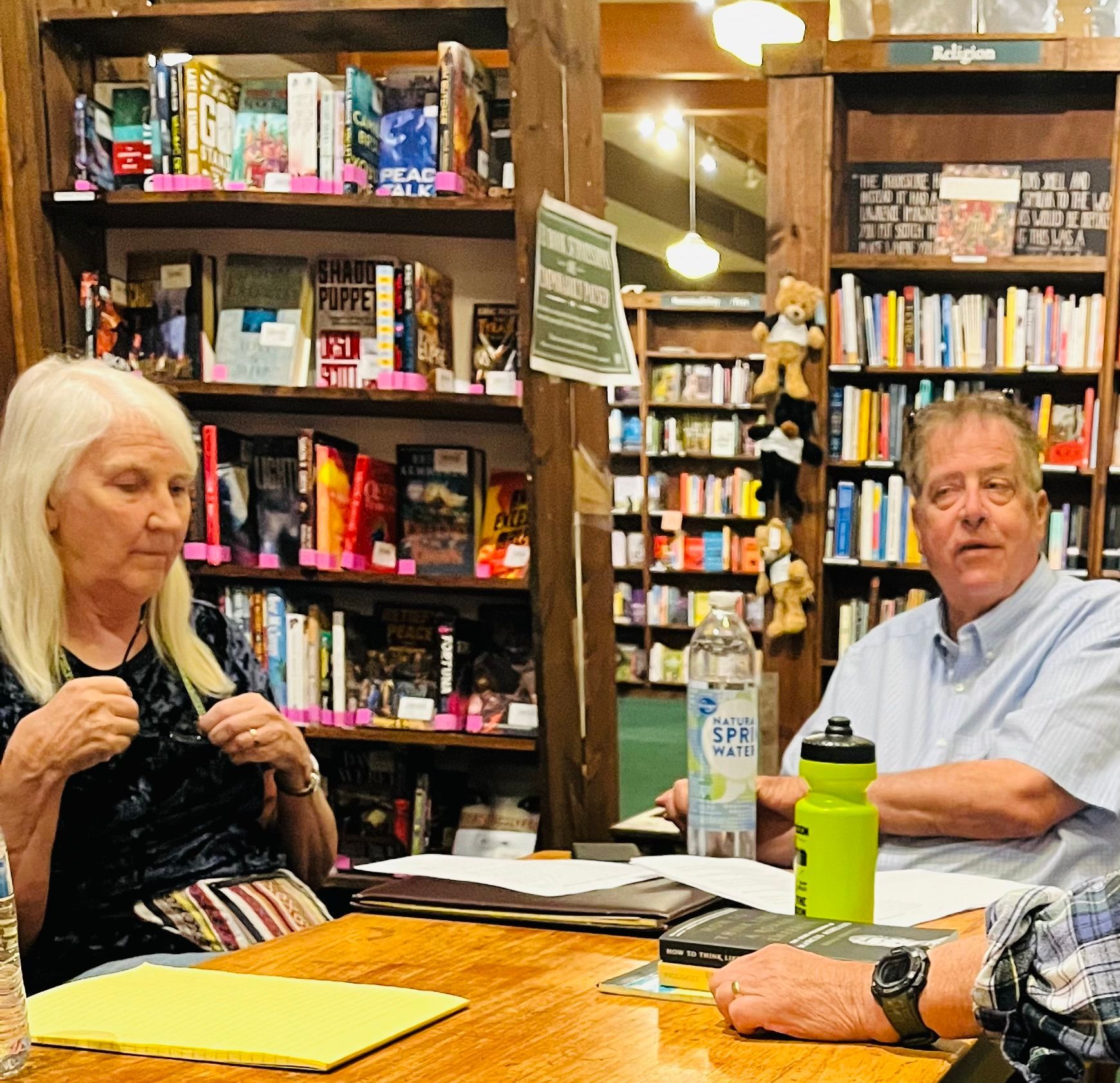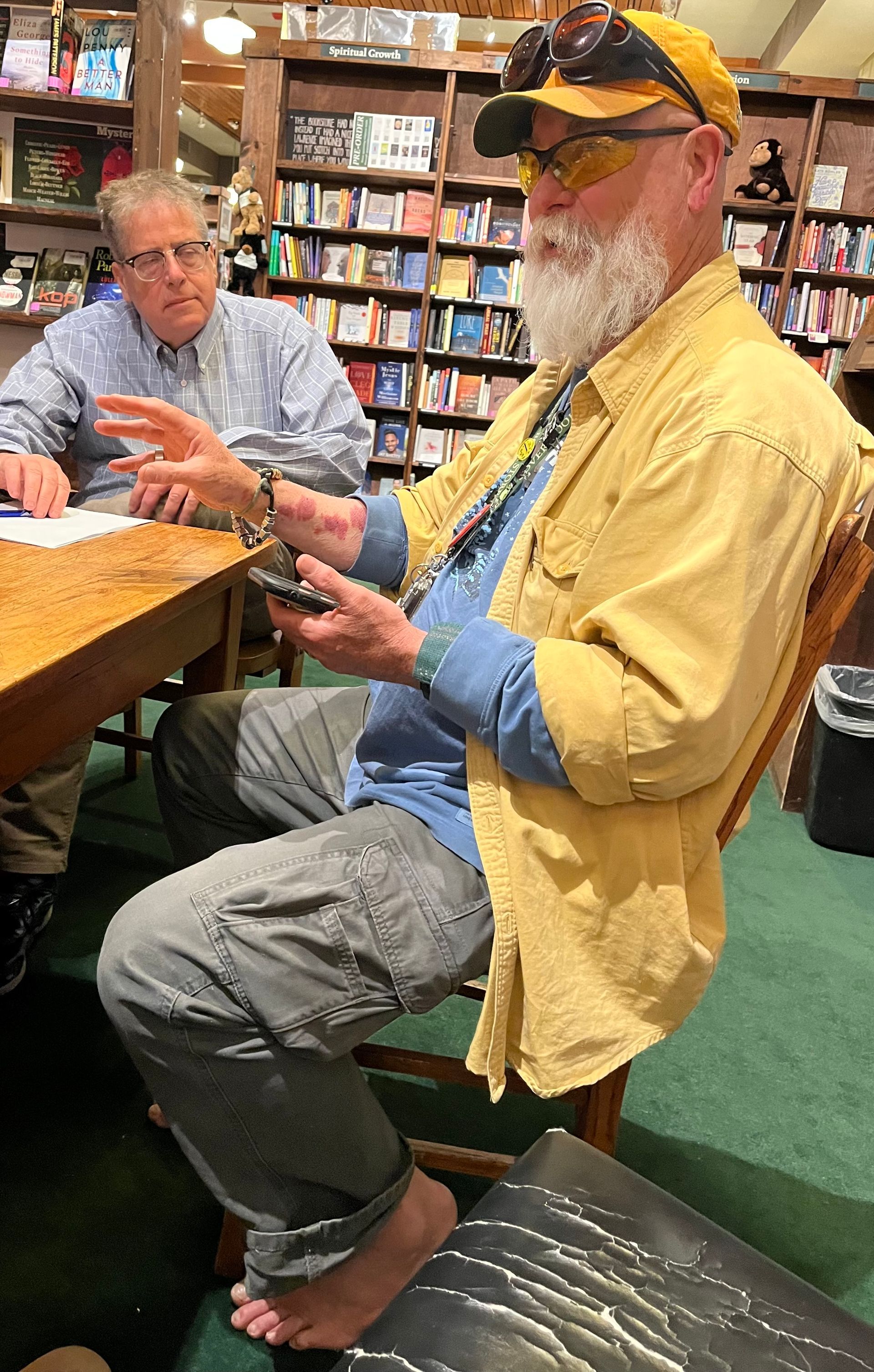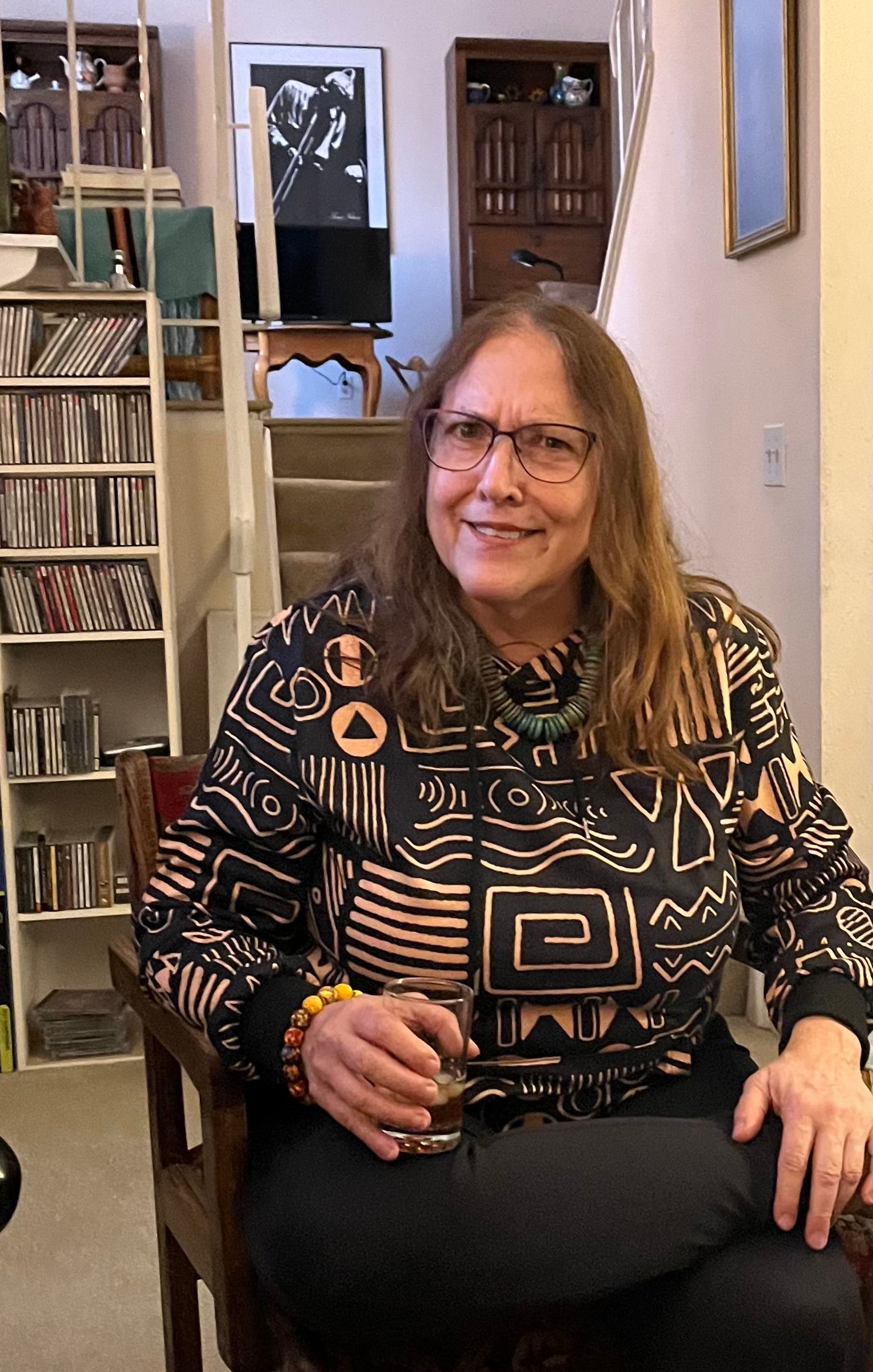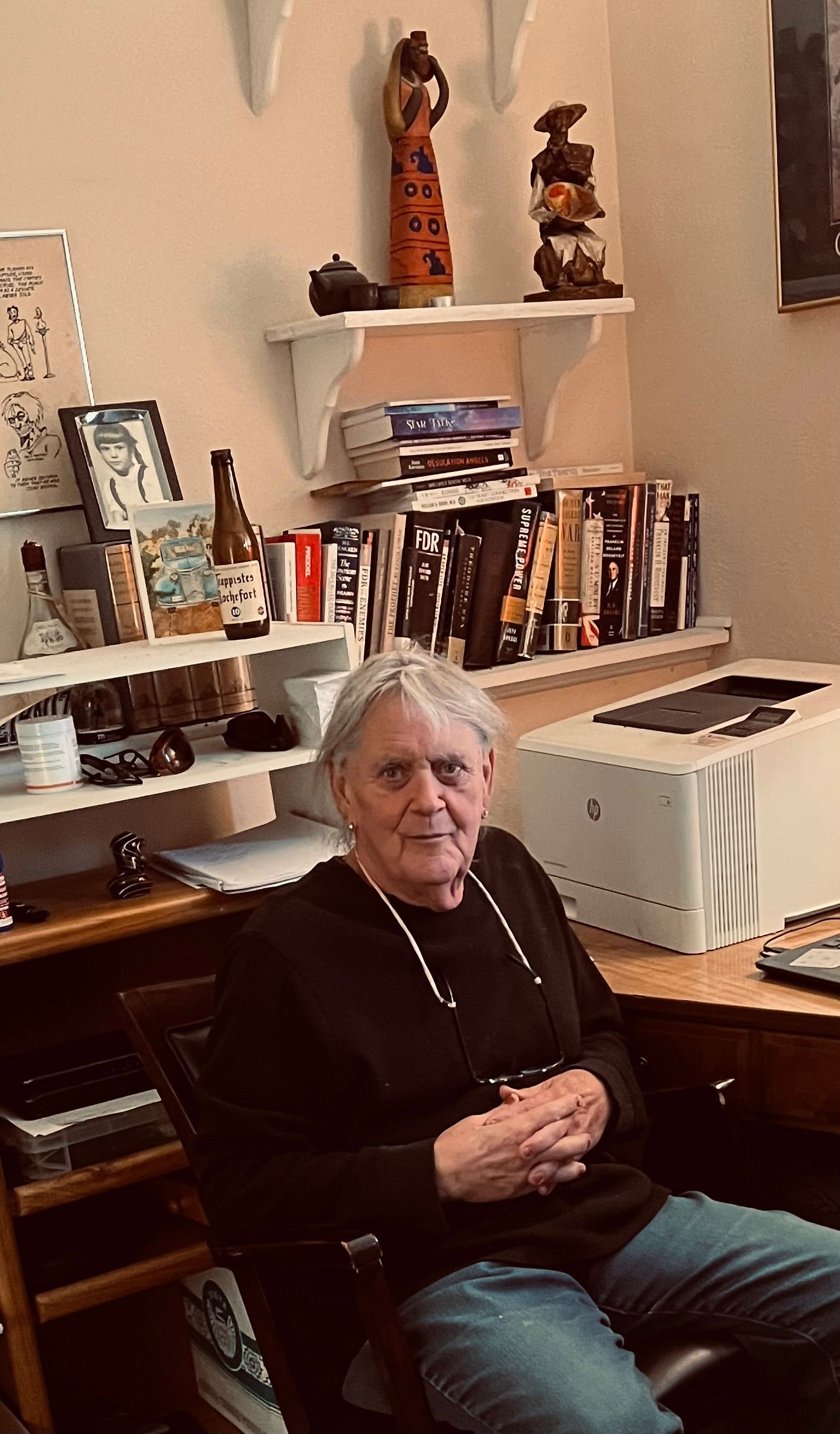Thursday's Columns
October 31, 2024
The Continuing Saga
Darwyn Van Wye,
Quin County Lawyer,
Real Estate Broker,
Writer, Eccentric
by
Craig Chambers

Culley Jane Carson and Craig Chambers at the Tattered Covered Writer's Group discussing his Halloween Column. Looks like she's really into it.
The Scariest Monster
of them All
My sweeties, Annie and Abby, identical grand-twins, they’re 9. They’re awfully cute, I’d say adorable. I’ve taken time off work. I’m still wearing a suit and tie. I’m driving them. Annie is sitting in the front without a seat belt, hanging her head and her arms out the window. I tell her to stop and she doesn’t listen to me. “I got a wave,” she exclaims.
Abby is sitting in the far back, I guess you’d say the trunk – it’s a SUV. She’s learning how to swear. It’s important to encourage her vocabulary. She’s learned a list of swear words. It comes naturally to her. “I see a Goddamn mailbox,” she says. “I see a fucking telephone pole.” I’m proud, but I’m sure her mother Nancy-Renee would be appalled. I’ve told her to stop swearing and to sit in the back seat. She doesn’t listen to me either.
“Do you want me to send you to finishing school?”
“What kind of school is that?” Annie says.
“So you’ll learn manners and how to behave. Learn how to curtesy, which fork to hold, and how to properly sip a cup of tea.”
“Hell, no,” Abby says. “Son of a bitch. Such bull-crap!”
I beam with pride.
“When are you going to be finished? Annie says.
“You make a good point. Do you girls want costumes or not? Or should I turn the car around?”
That gets them to behave, if only for a minute or two.
We’re shopping for the big day. The store’s called Spirits. Not selling liquor as I first thought, but Halloween gear. I can’t stay mad at them for very long. They’re my grandkids – probably my best friends. Pretty soon I’ll be teaching them to drive and buying them cars, and when they start dating, ordering credit reports and criminal background checks.
At the store, they’re wide-eyed and excited. We look at the costumes: skeletons, giant spiders, cats, skull masks, vampires, super heroes, characters from Harry Potter and Disney and scary movies, witches, goblins, ghosts. There’s creepy music. Robotic monsters lurch out at you. Annie wants to be an angel with a halo and big wings. Abby, too.
I must say, I think little devil costumes fit their personalities better.
“Thank you for the fucking angel wings,” Abby says.
“What about you, Grand-pee?” Annie says. “Where’s your costume?”
“I’m going dressed as a lawyer,” I explain. “The scariest monster of them all.
--30--
Political Fiction?
by
Mark Lehnertz

Craig Chambers (left) with Mark Lehnertz at the Tattered Cover Writers Group
The World's Shortest
Political Career
After closing down the last items of company business, stepping away from seven years of intense data and computer work, after a prior seven working in R&D, it was time to look at the world with fresh eyes.
For a couple of weeks the days’ activities were mostly a matter of thinking and writing. What skills / abilities / knowledge, what experience, what education had I to draw upon.
Degreed schooling included studying politics, economics, philosophy / public administration / math, engineering, computer / data design and always, always statistics. Experience included R&D, entrepreneurial start up and deep business planning that ultimately raised millions of dollars that became several businesses, even if most left little but lint in my pocket.
Curiosity-fueled education continued beyond post-graduated work and considerable networking with clients, community members, and competitors left a deep awareness of both private and public issues/problems, and development flows… au courant .
Spilling from news-media was a flood of immanent disaster. Frequently, though, such apparently intractable problems turn out to be merely misunderstood characterizations, which re-examined from a different angle show clearer approach. What could be done if…
Politics! …a place rife with great egos, too many mediocre minds, and demonstrably failed solutions to so very many problems. Could a problem solver find a place in this milieu?
Changing the names and party affiliations to hopefully protect the author from petty reprisals, the next step for two calls proceeded in this way:
“Hello?” The voice answered the phone call at the Depublicrat Party State Headquarters.
“Hello, my name is [redacted]. Is State Chairman Bob Rogers there?”
“May I ask what this is about?”
“Certainly. I recently sold my business and am interested in sitting down with him to discuss his views on the state of society and how it might be possible to address some of those issues.”
“Oh, my. Let me check if he is available.”
Less than two minutes later… "Hello, this is Bob. How can I help you?”
“I would like to buy you lunch.”
“Ummm-hmh. Why?”
“I’d like to meet you and get your understanding on where we are with some of the perceived problems that seem to dominate the news so often. Maybe explore the possibility of public service, if there is a fit.”
The sigh was loud and impatient.
“Tell you what, I’ll save us both some time. Send me a check for $50,000 and I will put you on the ballot for next election. What county do you live in?”
“Not exactly what I’m looking for. Finding if there’s a fit requires a bit more conversation.”
“Look, it’s simple. In this game you got to pay to play. If you’re serious you’ll send me the money.”
“How about I bring a check with me to lunch. If I like what I hear, I’ll sign it.”
“Pay! To! Play! It’s that simple. If you’re serious, check up front, then call me about lunch. Otherwise you are wasting my time.”
Still listening to the receiver after the second-call hangup, it was amazing how the dial tone sounded more reasonable, more professional. Never before had it been so clear that in lieu of two-parties trying to keep the founders’ dreams alive for the future, there is instead a simple set-piece — Street Theater with television involved.
--30--
From our Chicago Correspondent
Visiting us This Week
at The World Headquarters
of Westphalia Publishing
Wonder
by
Susan Mullen

Susan Mullen at the World Headquarters of Westphalia Publishing in Aurora, Colorado
Wonder
Who will forgive
our irreverence
As we grow from babes
our believing fades
in wise old age
We strain to grasp
a shroud of something
sure and true
As we grew so did
our disbelief
an empty lot green, ripe and feral
invasive, wild, strangling vines
And all the while the summer sun shines
What is there in pantry or in cellar?
Now the north wind blows gray.
Arrogance is
A cobwebbed shelf sitting empty
--30--
Our
Story
by
Lawrence Abby Gauthier
ace reporter
The Westphalia Periodic News

Our Ace Reporter at Work
The election is just around the corner. I’m on the edge of my seat. I’ve blackened the little ovals and slipped my ballot into the mail box in front of the King Soopers down the street. For the first time in my life I’ve voted for somebody other than Lyndon Larouche. So I’m feeling kind of nostalgic.
I first met Larouche in 1978. At the time, I was a reporter for a major Detroit metro. At the time, Detroit was sinking fast. The oil embargoes had sent the price of a gallon of gas sky high, like overnight. There were long lines at gas stations. Fistfights. “Peak Oil” entered into the vernacular. “Limits to Growth.” “Small is Beautiful.” An Energy Czar was appointed in Washington. A rocker burst out… “I can’t drive 55!!!”
Everybody started buying small Japanese imports. A wave of layoffs swept through the big car factories — Pontiac Motors. Cadillac. Buick. Oldsmobile. Suddenly, Motor City, Motown, the Technological Mecca of the World had the highest unemployment rate in the nation. Nerves were on edge. You could feel it in the streets I roamed as a reporter – We were running out, out of something as vital as water and air… Energy. We might Conserve to buy a little time, but the end was near.
I wrote lots of human interest stories about young couples expecting their second — the war was over, they had family connections in the union, a good paying job with a secure future.
I sat at their kitchen tables after they’d learned their factory was being closed.
I was also working on the Hoffa case and got to know people who knew him and the dock workers and truckers living middle class lives because of Hoffa’s Master Freight Contract and one thing led to another and that’s how I met Lyndon Larouche.
Larouche was in Detroit to meet with Teamster leaders and was staying in a room on the sixth floor of an older downtown hotel. Two armed security guards were stationed at his door. I’d been told they’d been trained at Mitch Werbell’s paramilitary camp in the swamps of Louisiana.
Greeting me, the first thing Larouche did was to offer me a Macdonald’s burger from a sack he had.
We started the interview.
Without denying the distressing facts on the ground, he said that none of it was necessary because we were not running out of energy. Everything was energy, energy equals mass times the speed of light squared. So it couldn’t be true what everybody was saying, that we were running out.
I was hooked. If (and it was a big if), if it was true that we weren’t really running out, it would be the biggest story in the world, especially in Detroit. People would be cheering and parading in the streets. The story had Pulitzer Prize written all over it. I’d be famous. I’d get on the Johnny Carson Show.
However, the august New York Times, itself, had labeled Larouche a Trotskyite, a Communist, a Fascist, a Cult leader crackpot Conspiracy Theorist, or whatever else they could come up with. Henry Kissinger sent a secret memo to the FBI saying that Larouche was dangerous and should be dealt with. (I have a copy of the memo, which was declassified a few years ago) As a seasoned reporter, I knew I had to find out for myself if Larouche was also a bull shitter, or worse.
As founder of something called the Fusion Energy Foundation, he had contacts with contacts and I was able to get a telephone interview with Edward Teller, the so-called “father” of the hydrogen bomb, who was then heading up efforts at the Lawrence Livermore National Laboratory to control thermonuclear fusion reactions.
I think Teller liked me. He asked me things like where I had grown up and was it true that Lake Superior is always too cold to swim in.
He told me a little bit about growing up in Hungary.
He then said something that changed my life. He said fusion was not science limited, but funding limited. He had solved the science, but was baffled by money. I suddenly realized how baffled about money that I was, too. There was no scarcity of energy anywhere in the universe we think we know about. There was only a scarcity of money. Could it be that money was more powerful than the laws of the universe? It sounded crazy.
It sounded crazy to Larouche, too. He had served in India during World War II and had witnessed the squalor and the desperation of the lives lived by people who did not have what they needed just because money was scarce and they didn’t have enough of it for anything better, like the lives lived by the few on the side of the hill.
After the war, Larouche became a heterodox economist and thought up an economic system where money was not a limiting, but a liberating factor so we could build fusion reactors and high speed rail from New York to Moscow across the bridge over the Bering Sea.
Back in the 70s he revealed to me what was possible.
He was thrown into prison. I was merely exiled from the Press.
He’s gone now but not his ideas. He used to say that ideas were what grants us temporal immortality.
After his death in 2019, his wife, Helga was honored at a Chinese State Dinner recognizing her husband as one of the intellectual founders of what’s today called the Belt and Road Initiative, which, back in the 70s, we called “The New Silk Road Project.” He had also long supported the fundamental concepts of BRICS and today half the people in the world are within its fold.
I always felt good voting for Larouche, even though people said I was being foolish and I said that it feels good to vote for something you believe in.
But this year it’s different and I don’t feel so good. I don’t know what I voted for. I know what I hope I voted for. Still, I’m depressed, though I know I’ll get over it because I still believe in the Idea of Progress. As Leibniz said: “Whatever is Possible, Demands to Exist.”
